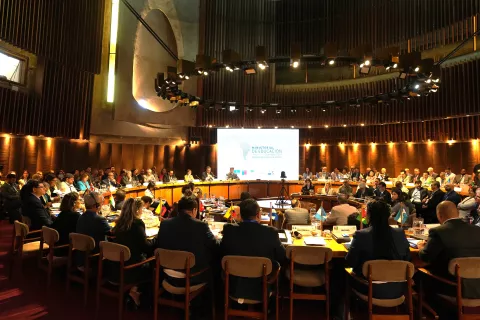Women are portrayed as objects of sexual desire and men as leaders in advertising in Latin America and the Caribbean, new research confirms
UNICEF and the Geena Davis Institute for Gender in Media warn of the harmful impacts of these gender stereotypes on children and call on advertisers to promote gender equality.

- Available in:
- Español
- English
Panama City, 6 December 2022 - Two new studies from UNICEF and the Geena Davis Institute for Gender in Media find that harmful gender norms and stereotypes are present in advertising in Mexico and four Caribbean countries - Jamaica, Barbados, Saint Lucia, and Trinidad and Tobago.
The findings show that women and men appear in advertisements at similar rates in the five countries. However, their portrayals often reinforce discriminatory gender norms. The advertisements tend to depict women as caregivers and objects of sexual desire and men as breadwinners and leaders. In addition, the advertisements fail to capture diversity by widely excluding population groups, such as people with disabilities, among others.
“Children in Latin America and the Caribbean are bombarded by ads online, on TV and on billboards in the street. They grow up seeing men as leaders and women as objects of sexual desire, and these harmful stereotypes become the norm,” said Youssouf Abdel-Jelil, UNICEF Regional Director a.i. for Latin America and the Caribbean.
The two new studies are part of UNICEF’s work with partners – including the EU-UN Spotlight Initiative that funded the Caribbean study – to generate evidence, knowledge, and tools to help ensure children, girls, and women everywhere can live free from violence. The research provides the first public systematic analysis of gender representations in advertisements in Latin America and the Caribbean and serves as a benchmark for making advertising more gender-sensitive in the region.
“This region has some of the highest rates of gender-based violence in the world. Governments and advertisers must work together to ensure children consume content that imagines a more equal society where men can be caregivers, women can hold the highest office, and girls feel safe wherever they are,” added the UNICEF Regional Director.
“Although the studies highlight that ads are still reinforcing harmful gender norms, we are heartened to see that in both studies several ads are challenging gender stereotypes. And, we know from research that consumers are rejecting harmful stereotypes in ads and are positively rewarding brands that are diverse, inclusive and reflecting positive portrayals of gender roles”, said Madeline Di Nonno, President & CEO, Geena Davis Institute on Gender in Media.
To help promote gender equality, diversity, and non-violence across the region, UNICEF calls on advertisers and marketing agencies to:
- develop content that promotes positive messages that advance human rights and challenge harmful stereotypes around violence against women and girls.
- strengthen gender-sensitive quality testing and evaluation mechanisms of advertising content.
UNICEF also urges policymakers and international organizations to:
- engage in advocacy with local advertising-standards associations to create or strengthen statutory guidelines.
- invest in research and building the evidence base, including around the nexus between advertisements, gender socialization, discriminatory gender norms, gender inequality, and violence against women and girls.
Media contacts
About UNICEF
UNICEF works in some of the world's toughest places, to reach the world's most disadvantaged children. Across more than 190 countries and territories, we work for every child, everywhere, to build a better world for everyone.
For more information about UNICEF and its work for children, visit www.unicef.org/lac/en.
Follow UNICEF on Twitter and Facebook.
About Geena Davis Institute for Gender in Media
Founded in 2004 by Academy Award Winning Actor Geena Davis, the Institute is the only research- based organization working collaboratively within the entertainment industry to create gender balance, foster inclusion and reduce negative stereotyping in global family entertainment and media. Visit seejane.org for more information.




